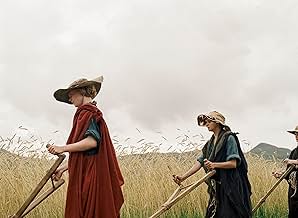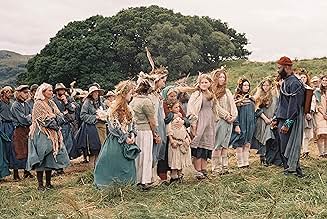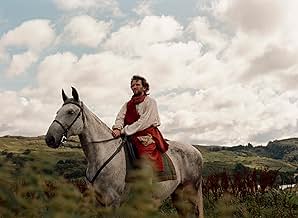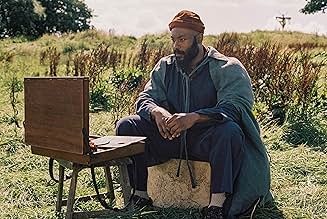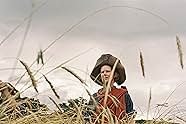अपनी भाषा में प्लॉट जोड़ेंOver seven hallucinatory days, a village with no name, in an undefined time and place, disappears.Over seven hallucinatory days, a village with no name, in an undefined time and place, disappears.Over seven hallucinatory days, a village with no name, in an undefined time and place, disappears.
- निर्देशक
- लेखक
- स्टार
- पुरस्कार
- 4 कुल नामांकन
फ़ीचर्ड समीक्षाएं
Somewhere in Britain in what appears to be the seventeenth century, a small village finds that its way of life, pretty much unchanged for generations beyond count, is under threat from outsiders.
The first outsiders are two men and a woman who are accused of arson - even though the fire was almost certainly started by villagers under the influence of magic mushrooms. The second is a map-maker (beautifully played by Arinze Kene) brought in by the lord of the manor, Master Kent (Harry Melling) to chart the village with a view to increasing it's wealth through raising more sheep. Last there is Master Jordan (Frank Dillane, who's performance is both understated and wonderfully sinister). He's the cousin of Kent's late wife, and announces that he's now the legal owner of the village and intends to evict everyone to turn the place entirely over to sheep.
Also key to events is Walt (Caleb Landry Jones) an outsider who was Kent's boyhood friend who married a village girl (now deceased) and is simultaneously part of the village and not part.
Oddly for the seventeenth century, there is no priest or any other religious figure either in the community or amongst the outsiders.
Suspicion and paranoia erupt; a crime is committed (we never do find out who perpetrated it); neighbour turns against neighbour; Kent and Walt are revealed to be seriously lacking in backbone; and things end with a scene out of Fiddler on the Roof.
The cinematography is excellent and the landscape is a character in and of itself - but the film overall is a disappointment. The viewer is led to expect that there will be some sort of climax - presumably a bloody one - but the film just tails off into nothing.
The first outsiders are two men and a woman who are accused of arson - even though the fire was almost certainly started by villagers under the influence of magic mushrooms. The second is a map-maker (beautifully played by Arinze Kene) brought in by the lord of the manor, Master Kent (Harry Melling) to chart the village with a view to increasing it's wealth through raising more sheep. Last there is Master Jordan (Frank Dillane, who's performance is both understated and wonderfully sinister). He's the cousin of Kent's late wife, and announces that he's now the legal owner of the village and intends to evict everyone to turn the place entirely over to sheep.
Also key to events is Walt (Caleb Landry Jones) an outsider who was Kent's boyhood friend who married a village girl (now deceased) and is simultaneously part of the village and not part.
Oddly for the seventeenth century, there is no priest or any other religious figure either in the community or amongst the outsiders.
Suspicion and paranoia erupt; a crime is committed (we never do find out who perpetrated it); neighbour turns against neighbour; Kent and Walt are revealed to be seriously lacking in backbone; and things end with a scene out of Fiddler on the Roof.
The cinematography is excellent and the landscape is a character in and of itself - but the film overall is a disappointment. The viewer is led to expect that there will be some sort of climax - presumably a bloody one - but the film just tails off into nothing.
I saw this film a while ago now, in the cinema. I did not write a review at the time but as I was just looking back at its IMDB page I thought I might as well since it has stayed with me ever since. It takes a fascinating point in history and manages to evoke the meaning of this great change taking place to a modern audience who can not really truly comprehend what came before. The idea of land unseparated and fenced apart is so far off now. And the cinematography and caleb landry jones' performance in particular portray the immaterial meaning of that. Harry Melling is also good and despicable.
Harvest (2024) is a drama (not a horror) about the dispossession of traditional rural communities from capitalist exploitation by the landowning class, and the internal conflicts within such communities. It is based on a book of the same name set in England, but adapted to film by Greek director Athina Tsangari and US producer Joslyn Barnes with the setting changed to Scotland and the historical period stripped of specificity. The film offers an exoticist generalised imaginary of rural island Scotland, based on something between the extended universe of The Wicker Man and the days of the witch trials, which I would speculate are the limit of the historical and cultural research that went into this film.
The central plot of the film, the employment of a mapmaker by the feudal overlord of the island in order to facilitate the exploitation of the land and remove the labour from it, is an interesting enough story of conflict between innovation and traditional community. Watching these themes explored through the 16mm cinematography, filmed on location in Argyll, Scotland, and some beautiful lines of dialogue, could be a nice film. But unfortunately, I am Scottish, albeit a lowlands, bourgeois Scot, and watched the film at one of few screenings in Scottish cinemas. My desire to see specificity, or at least some attempt at naturalism in the dialogue and depiction of quotidian life, therefore took over from any capacity to view the film's merits objectively. However, I feel that this criticism is appropriate because, at least in the screening I attended, the audience benefited from English subtitles. This suggested to me that the film's producers felt the use of authentic Scottish language was particularly exotic and important to the film's setting. So it's by this metric that I evaluated the film.
Firstly, I was somewhat impressed by the film's use of actors who could do authentic Scottish accents, although these were Glaswegian accents and surely nothing like how the crofters of ye olde times spoke. Some of the insults thrown by two characters who were pilloried for burning "Master Kent's" barn even got some decent laughs from the audience, when they stoically refused to be nice to their captors who offered them mercy. It makes a nice change from films about Scottish history performed by actors who can't accurately imitate any Scottish accent.
Then, there was everything else: the costumes that were Dark Ages bordering on Industrial Revolution. The neighbouring villager who had her hair cut off and inexplicably spoke Brazilian Portuguese as if it were a mystic jargon, despite some expository dialogue right at the start of the film emphasising the island's remoteness. (This character also in one scene pisses on the main character's face). The confusion between the Scottish history of the Highland Clearances, referenced by a mention of the villagers being replaced by sheep; and the English history of the Inclosure Acts, which was the setting of the Jim Crace novel on which the film is based, referenced by mentions of "the commons". The rather implausible claim by one villager on the island never to have seen the sea, which at least for me brought to mind stories of working class Glaswegians who had never seen the sea despite living only 10 miles away. Plausible but unusual of Glaswegians, not plausible at all of Scottish islanders.
Then the moment that the "Master's" cousin who owns the island's industry arrives, dressed dandyishly and with a posh English accent, suddenly the film begins to feel like a real costume drama. Perhaps this character was more closely based on the source material?
I feel that I wasted my time watching Harvest. It was misleadingly described as a horror, which it is not, and I left without any good reason to remember this film. It pales in comparison to The Wicker Man, from which it adopts stereotypes in its depiction of Scottish island life. Where Wicker Man did contextualise itself within Scottish social history, despite not being a serious historical film, Harvest refuses to indicate what its location and historical period are, opting instead for a generalised place and time, comprised of stereotypes about Scotland taken from horror films like Wicker Man and about the witch trials. Where Wicker Man had a clearly defined plot with an ending open to interpretation, Harvest has a slightly messy narrative but a relatively clear message.
I don't wish to be pedantic about every film set in Scotland, but this was filmed on location in Scotland and cast Scottish actors, so the producers clearly felt that authenticity was important. In fact, they knew that the script required authenticity, but they only delivered a surface-level form of it. If the aim of the film was to make a point about traditional rural communities, then this film has failed.
The central plot of the film, the employment of a mapmaker by the feudal overlord of the island in order to facilitate the exploitation of the land and remove the labour from it, is an interesting enough story of conflict between innovation and traditional community. Watching these themes explored through the 16mm cinematography, filmed on location in Argyll, Scotland, and some beautiful lines of dialogue, could be a nice film. But unfortunately, I am Scottish, albeit a lowlands, bourgeois Scot, and watched the film at one of few screenings in Scottish cinemas. My desire to see specificity, or at least some attempt at naturalism in the dialogue and depiction of quotidian life, therefore took over from any capacity to view the film's merits objectively. However, I feel that this criticism is appropriate because, at least in the screening I attended, the audience benefited from English subtitles. This suggested to me that the film's producers felt the use of authentic Scottish language was particularly exotic and important to the film's setting. So it's by this metric that I evaluated the film.
Firstly, I was somewhat impressed by the film's use of actors who could do authentic Scottish accents, although these were Glaswegian accents and surely nothing like how the crofters of ye olde times spoke. Some of the insults thrown by two characters who were pilloried for burning "Master Kent's" barn even got some decent laughs from the audience, when they stoically refused to be nice to their captors who offered them mercy. It makes a nice change from films about Scottish history performed by actors who can't accurately imitate any Scottish accent.
Then, there was everything else: the costumes that were Dark Ages bordering on Industrial Revolution. The neighbouring villager who had her hair cut off and inexplicably spoke Brazilian Portuguese as if it were a mystic jargon, despite some expository dialogue right at the start of the film emphasising the island's remoteness. (This character also in one scene pisses on the main character's face). The confusion between the Scottish history of the Highland Clearances, referenced by a mention of the villagers being replaced by sheep; and the English history of the Inclosure Acts, which was the setting of the Jim Crace novel on which the film is based, referenced by mentions of "the commons". The rather implausible claim by one villager on the island never to have seen the sea, which at least for me brought to mind stories of working class Glaswegians who had never seen the sea despite living only 10 miles away. Plausible but unusual of Glaswegians, not plausible at all of Scottish islanders.
Then the moment that the "Master's" cousin who owns the island's industry arrives, dressed dandyishly and with a posh English accent, suddenly the film begins to feel like a real costume drama. Perhaps this character was more closely based on the source material?
I feel that I wasted my time watching Harvest. It was misleadingly described as a horror, which it is not, and I left without any good reason to remember this film. It pales in comparison to The Wicker Man, from which it adopts stereotypes in its depiction of Scottish island life. Where Wicker Man did contextualise itself within Scottish social history, despite not being a serious historical film, Harvest refuses to indicate what its location and historical period are, opting instead for a generalised place and time, comprised of stereotypes about Scotland taken from horror films like Wicker Man and about the witch trials. Where Wicker Man had a clearly defined plot with an ending open to interpretation, Harvest has a slightly messy narrative but a relatively clear message.
I don't wish to be pedantic about every film set in Scotland, but this was filmed on location in Scotland and cast Scottish actors, so the producers clearly felt that authenticity was important. In fact, they knew that the script required authenticity, but they only delivered a surface-level form of it. If the aim of the film was to make a point about traditional rural communities, then this film has failed.
Hmmm. As a Scotsman, I think this is one of those films that I'm supposed to like - it has a solid cast and an interesting concept underpinning it - but I ended up distinctly underwhelmed by the lacklustre feel of the whole thing. An agrarian, Scots, community awaken one morning to find that one of the barns of the laird "Kent" (Harry Melling) has been damaged by fire. As if that wasn't curious enough, there is also some smoke billowing from the opposite end of their village where some newcomers have settled for the night. Suspicions run riot, but before the people do likewise "Walt" (Caleb Landry Jones) attempts to see just what happened and two of the visitors end up in the stocks. Meantime, the villagers are also a little wary of "Quill" (Arinzé Kane) who not only dresses strangely but has been tasked by their boss with mapping out his estate to increase productivity. As the story unravels, we discern that "Kent" and "Walt" are old friends but that tragedy has impacted on both of their lives rendering them shadows of their former selves. Things come to an head when the enigmatic "Jordan" (Frank Dillane) arrives and claims ownership of the entire village and demands that everyone shift so he can rear more sheep. Where are they to go? Now some emphasis is made on the local and sometimes quite earthy dialect used here, but sadly the audio mixing is frankly rather poor and so half the time it's quite difficult to hear what dialogue there is - and that's not great for a drama that focuses substantially on characters and their conversations. As the actual plot itself slowly develops, we are presented with a series of mixed historical messages that contrive to make points that aren't really borne out by events or circumstances we can actually see, and as we move, lethargically, towards an inconclusive conclusion I found that not only was I confused, but I was also surprisingly disinterested by the whole affair. Neither CLJ nor Melling really impose themselves, though that's as much to do with their rather weak personas, and the internecine and superstitious behaviour of the population seemed a little too conveniently stereotypical of some things Scottish or English or British or even Brazilian! It does have a very authentic production design to it and effort has clearly gone into recreating a community run by a landed gentry - though, curiously, without any significant religious figure - who lived a completely different life from his serfs. I haven't read the book upon which this is based, but can guess that the politics behind the highland clearances might inspire somewhere here. Again, though, that aspect is as undercooked at the rest of this meandering effort. I've watched it twice now but feel I've got all I'm going to get from something that just feels incomplete and slightly frustrating.
Harvest: Set in Scotland during an undefined era, maybe late medieval but some anachronisms suggest a later period. Steeped in folklore and the heritage of rural life, Folk Horror also intrudes on this less than idyllic existence. A fire destroys a barn but the Harvest Feast goes ahead the next day, The estate owner has brought a cartographer to his lands, lands we learn that are no longer his but belong to a cousin. The cousin wants to enclose the commons, drive off the tenants and introduce sheep to the land. The map is not the territory but by drawing boundaries and giving names to previously unnamed features a new reality is created. Maks and costumes which would not be out of place in The Wicker Man are worn by the villagers, folk songs and dances are performed. Some of which hint at an adherence to old beliefs. The downfall of the villagers lies in their fear and mistrust of outsiders and their willingness to blame other ordinary people for their troubles rather than their oppressors. Witches are hunted and there are some violent scenes and deaths but the real horror lies in how a time of changes brings destruction to a traditional way of life. At 131 minutes it is overlong and would have benefitted from a 20 minute cut in it's running time. Directed by Athina Rachel Tsangari, Screenplay by Joslyn Barnes and Tsangari from the 2013 book by Jim Crace, 7.5/10.
In cinemas, streaming on MUBI from 8 August.
In cinemas, streaming on MUBI from 8 August.
टॉप पसंद
रेटिंग देने के लिए साइन-इन करें और वैयक्तिकृत सुझावों के लिए वॉचलिस्ट करें
विवरण
बॉक्स ऑफ़िस
- दुनिया भर में सकल
- $99,029
- चलने की अवधि
- 2 घं 13 मि(133 min)
- रंग
- ध्वनि मिश्रण
- पक्ष अनुपात
- 1.66 : 1
इस पेज में योगदान दें
किसी बदलाव का सुझाव दें या अनुपलब्ध कॉन्टेंट जोड़ें


